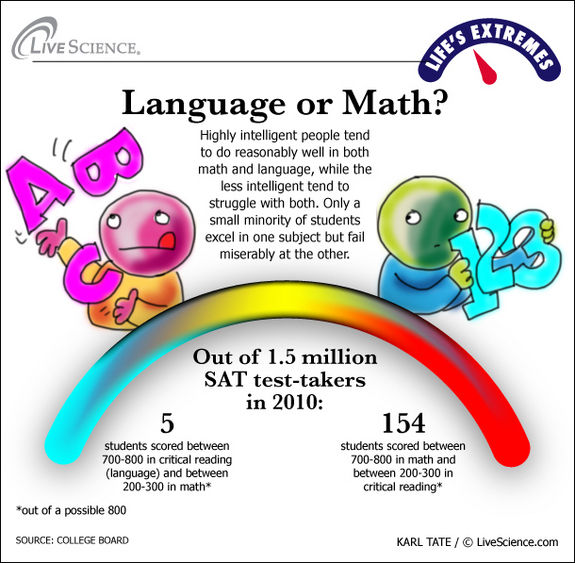I Am Good at Math but Poor in English
We hear this quite often from so many people, claiming that they are good in one area but quite lacking in another. In conversations regarding education that are not based on evidence, we often encounter myths and the statements, "I am good at Math but poor in English", or "I am good at English but poor in Math", are examples. Such claim is unlikely since according to data, most people either excel or struggle in both subjects.
Alright, either 5 or 154 out of 1.5 million are much more than 1 in a million. Still, the likelihood that an individual does well in one area and poorly in another is very small. 154 out of 1500000 is only 0.01 percent. The fact that academic competencies are closely related is important to keep in mind. Students who are proficient in math are also the students who do well in reading and science. This is also supported by evidence from a study that examines the performance in reading, math and science tests of 75000 students from 17 European countries. The study scheduled to be published in the Journal of Educational Psychology, is able to categorize these students into seven different profiles.
Educational systems should not isolate subjects so rigidly since academic competencies are interrelated. A math professor at Ohio University Chillicothe, Dywayne Nicely, takes advantage of this fact in his practice. By providing interventions in reading comprehension, he is able to raise students' scores in algebra II by 15 percent and in pre-calculus by 5 percent.
 |
| Above copied from LiveScience |
Alright, either 5 or 154 out of 1.5 million are much more than 1 in a million. Still, the likelihood that an individual does well in one area and poorly in another is very small. 154 out of 1500000 is only 0.01 percent. The fact that academic competencies are closely related is important to keep in mind. Students who are proficient in math are also the students who do well in reading and science. This is also supported by evidence from a study that examines the performance in reading, math and science tests of 75000 students from 17 European countries. The study scheduled to be published in the Journal of Educational Psychology, is able to categorize these students into seven different profiles.
Educational systems should not isolate subjects so rigidly since academic competencies are interrelated. A math professor at Ohio University Chillicothe, Dywayne Nicely, takes advantage of this fact in his practice. By providing interventions in reading comprehension, he is able to raise students' scores in algebra II by 15 percent and in pre-calculus by 5 percent.


Comments
Post a Comment